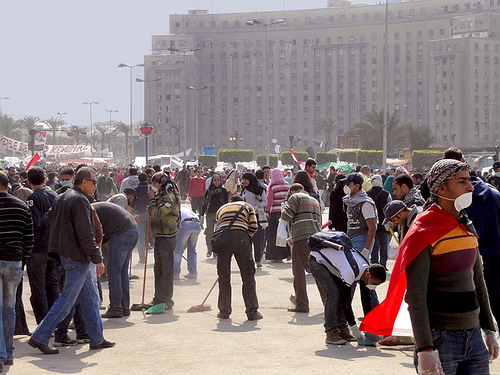
As new “days of rage” are announced across the Middle East and as the ‘Jasmine revolution’ spreads across the Maghreb and some of the most entrenched autocracies in the Middle East and Arabian peninsula, the word ‘revolution’ seems to be on everyone’s lips. Although the rest of the world, Europe included, has seen such people power-driven revolutions in the last years, this latest wave really caught the world by surprise.
How is it that decades of authoritarian oppression finally resulted in largely peaceful uprisings that are spreading like wildfire across the region? Did it come as a result of the Bush era’s democracy promotion ‘campaign’, as some right wing American politicians have argued (with just a little congratulatory tap on their own back)? Or should social media tools like Twitter and Facebook be seen as the true champions of this new media-driven process? Perhaps Julian Assange and WikiLeaks should get credit as revelations of the extravagant lifestyle of Tunisia’s first couple drove angry protesters to the streets in the very early stages of this collective Arab revolt against oppression?
Clearly the latter two both played into the complex equation that toppled the regimes of Ben Ali and Mubarak and has put many more regional despots under significant pressure to reform. Ultimately though the credit, and indeed responsibility as these revolutions turn into democracy-building exercises, lies with the people and the leaders of the opposition movements who were brave, daring and ingenious in the timing of the protests and in the way social media platforms and other tools from the handbook of peaceful revolutions were used to an impressive effect. The largely peaceful nature of these infectious uprisings has garnered a lot of praise from around the world, and rightly so. The jubilation on the streets of Tunis and Cairo was an inspiring sight when streamed on iPhones and computer screens around the world.
This is a new age of revolutions against oppression and a new age for global solidarity. The outcome of these revolutions may not yet be known, but there is no doubt that these past weeks have changed Arab and indeed world history for good.
Here are a few select publications from our Digital Library that provide context to these momentous events:
- From Dictatorship to Democracy, a seminal handbook by Gene Sharp on how to conduct nonviolent resistance against autocracies and a manual that many Egyptian protest leaders cited as an inspiration.
